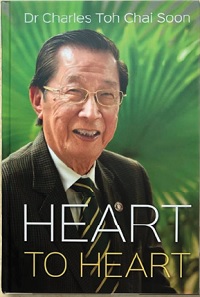Dr Charles Toh has often been described as Singapore's Father of Cardiology.1,2 He is a pioneer cardiologist who helped develop the Department of Cardiology at the Singapore General Hospital (SGH), set up the first Coronary Care Unit in 1966, and conceive and develop the idea of the National Heart Centre.
Heart to Heart is an eminently readable autobiography spanning Charles Toh's entire life, and makes for a really heartfelt read. It traces his family background where his paternal relatives migrated from China to Ipoh. His father worked as a banker and was a successful businessman. His mother was from Penang and looked after her family's diamond business, moving to Ipoh after their marriage.
Charles's primary education started at a Hakka primary school, but he later moved to an English language school. He was only 11 years old when the Japanese occupied Malaya in 1941 and he describes the places the family had to hide from the invaders. Eventually, when life in Ipoh became a little bit more normal, the family allowed him to attend a Japanese school. Charles gives a vignette of how the school was run, and that each lesson ended by singing a Japanese folk song. Incredibly he could continue piano lessons during this period.
After the war, he decided that he wanted to become a doctor and chose to study in Australia, and went on to do his housemanship there after graduation. Life was tough; he wrote: "I remember there were times I [worked] continuously for 72 hours, with short naps in between."In 1957, he decided to continue his postgraduate training in England. There, he decided to become a cardiologist. "I felt that it [cardiology] was based on very exact parameters, with logical conclusions based on a fixed set of clinical assessment tests and investigations – it was almost mathematical." Charles rotated through several other specialties before focusing on the heart. To this day, he believes that doctors should have a strong general foundation in all areas of medicine and surgery before becoming a specialist.
Charles returned to Singapore in 1960 at the age of 30 and soon obtained a position at the university section of SGH. He spent the next 15 years in this department, and helped to develop cardiology into a first–rate specialty. The time was fertile for specialisation and he was supported by illustrious doctors, including Prof ES Monteiro and Prof Khoo Onn Teik. He started a cardiology laboratory, heart catheterisation procedures and intensive monitoring of patients in the Coronary Care Unit which he established. He was president of the Singapore Cardiac Society twice and was the organising chairman of the 5th Asia Pacific Congress of Cardiology in 1972.
Charles strongly believes in research and he laid the foundation for medical research in Singapore. "I was passionate and committed to developing a culture of research in Singapore... a medical mind should be trained both in professional and research skills in order to be able to think originally." He rose up the institutional ladder at the National University of Singapore, and was appointed vice–dean in 1972. He became chairman of the National Medical Research Council from 1994 to 2000. When the Ministry of Health was contemplating building a heart centre at SGH, Charles was appointed chairman of the Advisory Committee on the development of the National Heart Centre in 1996.
As an educationist, Charles wrote: "I was later told by my students and nurses that I had a reputation for being very fierce." And his excuse was: "I had no time for trivialities." During his period at the university, he taught thousands of medical students and trained many graduates to become cardiologists. Yes, he might have been fierce, but he did get his students to think critically, independently and creatively. Many of his students have achieved great accomplishments in Singapore and abroad, and thank him for his mentorship.
Charles' contribution to public service is just as outstanding. He was a member of the Public Service Commission for 21 years from 1992 to 2013, and deputy chairman for the last four years.3 He was the only medical representative on the selection committee and over the years, he awarded hundreds of scholarships and promoted many civil servants to senior positions. He based his selection on the following principles: "We listened out for unusual, original and creative ideas on everything from current affairs, to how they envisioned the country would develop." He added: "Those who could communicate their thoughts clearly, had a broad range of interests, and displayed an open mind, were favoured."
In 1960, Charles married Dr Victoria (Vicky) Tan whom he met while she was working at SGH. They have three highly successful boys, one of whom is now deputy medical director of the National Cancer Centre Singapore. All three sons have written a few pages in this book. He has four lovely grandchildren. Sadly, Vicky developed liver cancer and passed on in 2010.
Charles is also a philanthropist and has been very big–hearted in donating to the National Heart Centre for research and education, to the National Cancer Centre for research on cancer, and to Xiamen University in setting up the medical school there.
I have known Charles for over 40 years and enjoy his great sense of humour in the doctors' tea room every morning. When he shared that he got a hole-in-one playing golf, we all congratulated him. He has a lovely sonorous voice and loves to sing Teresa Teng, Indonesian classics and other oldies. I heartily recommend this autobiography. It is very insightful and a wonderful account of the past 90 years of an outstanding doctor and humanitarian.

Title: Heart to Heart
Author: Charles Toh Chai Soon, as told to Low Shi Ping
Number of pages: 124
Type of book: Hardcover
Publisher: World Scientific Publishing Co Pte Ltd
Year of publication: 2019
SMA Members who wish to request for an autographed copy of the book, please email news@sma.org.sg. Limited copies available.